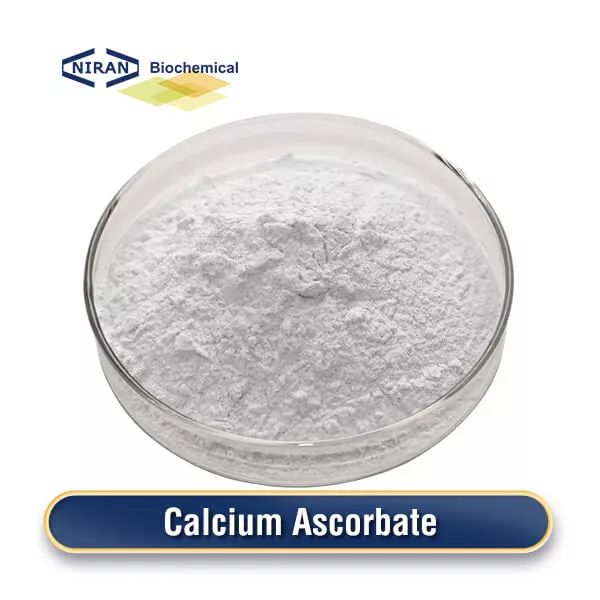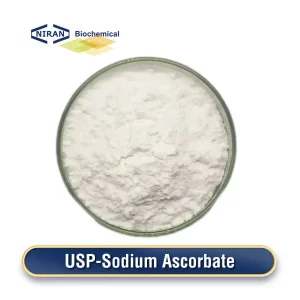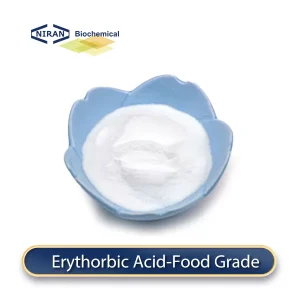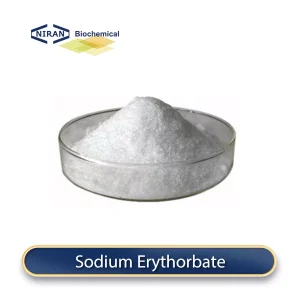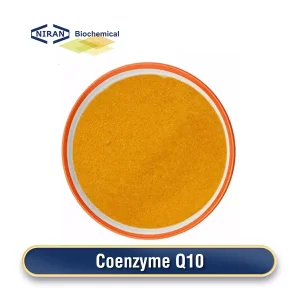What Is Calcium Ascorbate?
In addition to being more stable than Vc, calcium ascorbate also has superior absorption capabilities. In addition, due to the introduction of calcium, its nutritional fortification effect is also enhanced. The food, pharmaceutical, and other industries use it significantly. It appears to be powdered white.
The preparation process of Calcium ascorbate is mainly to directly react ascorbic acid (vitamin C) with calcium hydroxide or calcium carbonate to generate calcium ascorbate. This method has a simple process, few operating steps, high production efficiency, and is suitable for large-scale continuous production.
Related Parameters:
| Items | Standards |
| Specific Optical Rotation | +95°~+97° |
| PH(10% W/V) | 6.8-7.4 |
| Loss on Drying | ≤0.10% |
| Heavy Metals(as Pb) | ≤10ppm |
| Oxalate | Pass |
| Copper | ≤5ppm |
| Iron | ≤2ppm |
| Arsenic | ≤3 mg/kg |
| Fluoride | ≤0.001% |
| Assay | 98.0%-100.5% |
Recommended Dosage:
| Food name | Maximum usage(g/kg) |
| Juices and fruit-flavored drinks | 0.1-0.5 g/kg |
| Soft drinks | 0.05-0.2 g/kg |
| Canned fruit | 0.1-0.3 g/kg |
| Yogurt and dairy products | 0.05-0.2 g/kg |
| Bread and baked goods | 0.1-0.3 g/kg |
| Chocolate and candy | 0.1-0.3 g/kg |
| Salad dressings and condiments | 0.05-0.2 g/kg |
| Meat products and sausages | 0.1-0.3 g/kg |
| Canned fish and seafood | 0.1-0.3 g/kg |
| Bakery mixes | 0.1-0.3 g/kg |
| Sports drinks | 0.05-0.2 g/kg |
| Juice drinks | 0.1-0.5 g/kg |
Calcium Ascorbate Has A Wide Range Of Uses
1. Calcium ascorbate has a strong antioxidant effect and can effectively prevent the oxidation of fats, oils and other easily oxidized ingredients in food, thereby extending the shelf life of food.
2. Calcium ascorbate is the calcium salt of vitamin C (ascorbic acid), which provides both vitamin C and calcium, helping to prevent vitamin C and calcium deficiency.
3. Food can have a longer shelf life because calcium ascorbate can stop bacteria from growing and reproducing. In various juices, jams, jellies, and other items, it serves as a preservative.
4. Calcium ascorbate can be used to adjust the pH value of food and help maintain the acid-base balance of food, thereby improving the texture and flavor of food.
5. Calcium ascorbate can prevent fruits and vegetables from changing color during processing and storage, and maintain their natural color. It is widely used in canned fruits, juices and vegetable products.
6. During the processing of fruits and vegetables, calcium ascorbate can prevent enzymatic browning reactions and maintain the color and quality of the products.
7. In baked goods, calcium ascorbate can improve the processing properties of dough, increase the volume of bread and improve the texture of bread.
8. As a source of vitamin C, calcium ascorbate helps enhance human immunity and resist colds and other diseases. It is frequently found in functional meals and health goods.
User Asked Question:
Q: What is the functional difference between calcium ascorbate and calcium carbonate?
A: Calcium ascorbate and calcium carbonate are significantly different in function and use. Calcium ascorbate is mainly used in food and health products. It has multiple functions such as antioxidant, nutritional fortification, preservation and color protection. It provides both vitamin C and calcium. It is often used in juice, beverages, dairy products and infant food to enhance immunity, promote collagen synthesis and iron absorption.
Calcium carbonate is mainly used as a calcium supplement and acid neutralizer. It is widely used to prevent and treat calcium deficiency, osteoporosis and relieve symptoms such as excessive gastric acid and heartburn.
Calcium carbonate is also utilized as an industrial raw material for coatings, polymers, and building materials, as well as a food ingredient for applications like anti-caking, stabilizing, and leavening agents.
In short, the main characteristics of calcium ascorbate are its versatility and nutritional fortification, while calcium carbonate is mainly characterized by its high calcium content and wide industrial use. Which calcium salt is best dependent on the application situations and particular requirements.

